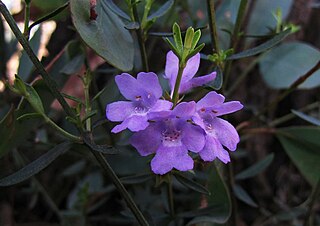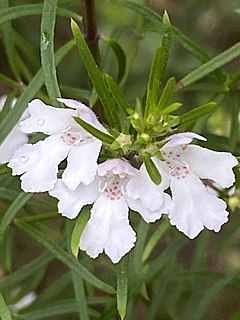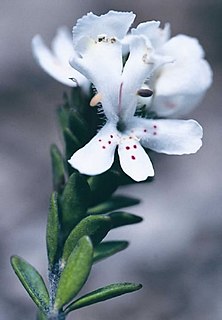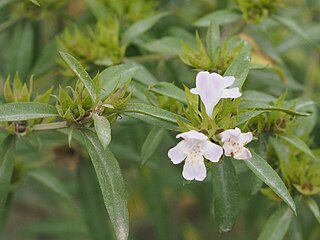
Westringia is a genus of Australian shrubs. As with other members of the mint family their upper petal is divided into two lobes. There are four stamens - the upper two are fertile while the lower two are reduced to staminodes. The leaves are in whorls of 3 or 4.

Lechenaultia is a genus of flowering plants in the family Goodeniaceae, the species native to Australia with one species also occurring in New Guinea. Plants in the genus Lechenaultia are glabrous shrubs or herbs with needle-shaped leaves, more or less sessile flowers with five sepals and five blue, white, or yellow and red petals in two unequal lobes, the fruit an elongated capsule.
Westringia cremnophila, commonly known as Snowy River westringia, is a flowering plant in the family Lamiaceae, a rare shrub that is endemic to Victoria, Australia. It is a small shrub with leaves mostly in groups of three and white flowers.

Westringia crassifolia, commonly known as whipstick westringia, is a flowering plant in the family Lamiaceae and is endemic to Victoria, Australia. It is a rare shrub with narrow leaves and lavender-purple or pink flowers in spring.

Westringia eremicola, commonly known as slender westringia or slender western rosemary, is a flowering plant in the family Lamiaceae and is endemic to eastern Australia. It is a small shrub, with narrow leaves and pink, mauve to white flowers.

Westringia dampieri, commonly known as shore westringia, is a flowering plant in the family Lamiaceae, it grows in South Australia and Western Australia. It is a small, dense shrub with white, mauve, cream or purple flowers.

Westringia longifolia, commonly known as long-leaved westringia, is a flowering plant in the family Lamiaceae and is endemic to southeastern Australia. It is a small shrub, with linear leaves and mostly white flowers.

Westringia kydrensis, also known as the Kydra Westringia, is a species of plant in the mint family that is endemic to Australia.

Westringia saxatilis is a species of plant in the mint family that is endemic to Australia.

Westringia amabilis is a species of flowering plant in the family Lamiaceae and grows in New South Wales and Queensland. It is a small shrub with ovate-shaped leaves and light mauve to white flowers and brownish spots in the throat.

Westringia parvifolia is a species of plant in the mint family that is endemic to Australia.

Westringia sericea, also known as native rosemary or silky rosemary, is a species of plant in the mint family that is endemic to Australia.

Westringia lucida, also known as Shining Westringia, is a species of plant in the mint family that is endemic to Australia.

Westringia blakeana is a flowering plant in the family Lamiaceae and grows in New South Wales and Queensland. It is a small shrub with mauve to whitish flowers with brown spots and leaves arranged in whorls.

Westringia rupicola is a species of plant in the mint family that is endemic to Australia.

Westringia angustifolia, commonly known as scabrous westringia, is a flowering plant in the family Lamiaceae and is endemic to Tasmania. It is a small, upright shrub with mauve or white flowers.

Westringia fitzgeraldensis is a species of plant in the mint family that is endemic to Western Australia.

Westringia cheelii is a species of plant in the mint family that is endemic to Australia.

Westringia capitonia is a species of plant in the mint family that is endemic to Western Australia.

Westringia acifolia is a flowering plant in the family Lamiaceae and is endemic to Western Australia. It is a compact shrub with linear to needle-shaped leaves and white to cream flowers.



















